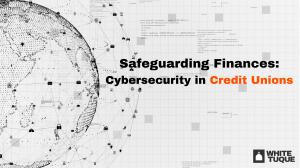
Technological advancements are taking place at an historically unprecedented rate. These rapid-fire shifts are reshaping industries across all sectors, and financial institutions are no exception. Further to this, credit unions are at a particularly unique risk to threat actors. The bad guys know that they can exploit your business through its people, its processes, and its technology. As trusted financial institutions that serve communities, credit unions face distinct challenges and responsibilities in protecting sensitive financial information.
Cybersecurity, therefore, is not just a necessity but a fundamental pillar for maintaining the trustworthiness and operationality of credit unions. Here are six factors that credit unions need to consider in deciding if they are properly prepared for cyberattacks:
1. Growing Cyber Threat Landscape
The digital age has brought unprecedented convenience, but it also comes with an increased risk of cyber threats. Credit unions, handling vast amounts of personal and financial data, are prime targets for cybercriminals. The rise of sophisticated hacking techniques underscores the urgency for credit unions to fortify their cyber defenses.
2. Protecting Member Data
Credit unions hold a wealth of sensitive information about their members, including personal details, financial histories, and transaction records. A cybersecurity breach not only jeopardizes the privacy of these individuals but also erodes the trust they place in the credit union. Robust cybersecurity measures are paramount to ensuring the confidentiality and integrity of member data.
3. Financial Stability & Reputation
A cybersecurity incident can have severe financial implications for credit unions. Not only do they face potential financial losses due to fraud and theft, but their reputation may also suffer irreparable damage. Members and the community at large expect their credit union to be a safe way to manage their finances. A breach could lead to a loss of confidence and a subsequent exodus of members.
4. Regulatory Compliance
Cybersecurity is not just about protecting against external threats; it is also about meeting regulatory expectations (NCUA and state, for example). Credit unions must adhere to stringent regulatory standards and compliance requirements. Failure to comply with industry standards may result in fines, legal consequences, and a tarnished regulatory record.
5. Operational Continuity
Cyberattacks disrupt normal business operations, leading to operational downtime and financial losses. Credit unions play a crucial role in the financial wellbeing of their members, and any interruption in services could have far-reaching consequences. Robust cybersecurity measures ensure operational continuity and the ability to provide uninterrupted services to members.
6. Preventing Financial Crimes
Cybersecurity is a vital tool in the prevention of financial crimes such as identity theft, fraud, and money laundering. By implementing strong security protocols, credit unions can deter criminals and create an environment where financial transactions are secure and trustworthy.
As threat actors continue developing their abilities along with the development of technology, credit unions must recognize the pivotal role of cybersecurity in safeguarding their members’ financial wellbeing. It is not merely a technical requirement but a fundamental commitment to trust, privacy, and financial stability. By investing in robust cybersecurity measures, credit unions can uphold their reputation as reliable guardians of their members’ finances and futures.
You can be prepared for cyber threats, starting today! Get in touch with our experts.


